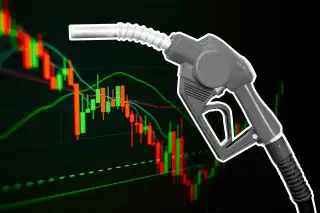What Soaring Gas and Oil Prices Mean for Your Investments

Rising oil costs have given consumers more to worry about than just high gas prices. What does the jump in oil prices mean for your investment portfolio?
Brent crude oil — the international benchmark for oil prices — and U.S. West Texas Intermediate crude oil futures both rose to their highest prices since 2008 on Sunday. The price spike comes as the U.S. and allies in Europe consider banning oil imports from Russia, leading to heightened concerns over market supply.
Rising energy prices had stocks spooked Monday, with the S&P 500 falling nearly 3% as investors worried about what the war in Ukraine could mean for the global economy and inflation.
Investors have experienced volatile financial markets in recent weeks amid the Russia-Ukraine crisis. Between what sanctions on Russia could mean for inflation, and how the Federal Reserve will react to the news, investors have a lot to keep in mind when it comes to what to do, if anything, to protect their portfolios.
While rising oil prices are far from the only factor hurting stocks in 2022, here's what experts say you need to know about how the high cost of oil could impact your investment portfolio.
Rising oil prices can be worrisome for markets as they mean higher costs for everything from heating and lighting homes to transporting goods.
Now, rising oil prices are triggering fears about a global recession, Michael Hewson, chief markets analyst at CMC Markets told The Wall Street Journal. "It’s hard to see much in the way of significant upside for stock markets now against a backdrop of continued escalation” in Ukraine, he added.
In a recent note to clients, Bespoke Investment Group wrote that there have been recessions following three of the notable commodity price rallies in the the Bloomberg Commodity Spot Index history: the recessions starting in 1973, 1979 and 2007.
However, it's difficult to know the impact that rising oil prices will have on an investment portfolio because it's hard to predict what actions central banks will take, says Melissa Brown, global head of applied research at Qontigo.
If oil prices continue to rise, central banks might raise interest rates to help fight inflation. Then again, much higher oil prices could have a negative impact on the economy, and perhaps that could mean central banks won't want to raise rates as much, Brown says.
Kathy Bostjancic, chief U.S. economist at Oxford Economics, told Money in late February that her firm no longer expects the Fed to raise rates by a full 175 basis points for the year, which was their earlier estimate.
Hiking interest rates is a tool the Fed uses to fight inflation. Higher interest rates make it harder for businesses and consumers to borrow, and that constrained spending is supposed to help bring the prices for goods like food and cars under control. But raising interest rates also tends to crimp prices for financial assets like stocks, which means that making money by buying and selling stocks can become a lot harder.
Another complication is that rising oil prices can also actually self-correct due to what's called demand destruction, which is when demand falls for a certain commodity, like oil.
Basically: the higher gas prices go, the less people want to drive, says Sam Stovall, chief investment strategist at CFRA Research. Lower demand for gas would tend to push prices lower. But because so many other aspects of our lives are based on fossil fuels, from heating and lighting our home to the transportation of goods and services we buy, Stovall adds, the demand will probably remain elevated.
While a spike in oil prices has been followed by a recession in the past — and the last time gas prices were this high was during the financial crisis and stock market crash in 2008 — some experts are saying the U.S. likely won't see the same outcome today, in part because consumers have lots of money saved and the labor market is strong.
If you have a well-diversified portfolio, your best move is likely to simply sit tight, Brown says.
"Things are very much in flux, so any change you make in your portfolio could be in the wrong direction," she adds.
There are investing strategies you might consider, but practicing caution is wise. If you're looking to take advantage of the situation by buying up energy stocks, it's important to keep in mind that Stovall says they are starting to get a bit pricey.
While CFRA is maintaining an overweight recommendation on the energy sector, the firm is becoming more selective on which stocks they're actually recommending. (An overweight recommendation indicates that analysts expect that stock or sector to out-perform the market in the months ahead.) The stocks CFRA has ranked highest based on their growth at reasonable prices are Ovintiv Inc., an oil and gas producer, and Targa Resources Corp., an energy infrastructure company.
Overall, it's best not to try to time the market. Instead, experts recommend taking this time to ensure your risk tolerance is still in line with your portfolio.
If the current market swings are causing you to lose sleep — maybe because you have short-term needs for cash — then you should definitely make sure you're well-positioned to meet those needs, David Sekera, chief U.S. market strategist at Morningstar, previously told Money.
More from Money:
Do You Own Russian Stocks Without Knowing It?